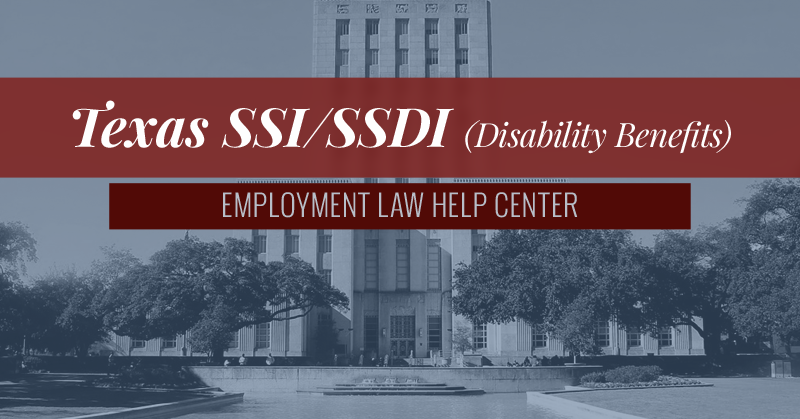Texas SSI/SSDI
A severe physical or mental disability can have a significant adverse impact on your ability to secure gainful employment and earn enough money to support yourself and your family, and the federal Supplemental Security Income (SSI) and Social Security Disability Insurance (SSDI) programs were established to provide life-saving benefits to individuals whose disabilities render them unable to work. If you are a resident of Texas and you are suffering from a physical or mental disability that prevents you from performing work you did before, or obtaining other gainful employment, you and certain members of your family may qualify for cash benefits from the government’s Supplemental Security Income or Social Security Disability Insurance program. Consult a knowledgeable SSI/SSDI lawyer today to determine what benefits you and your loved ones are entitled to.

Supplemental Security Income (SSI)
Supplemental Security Income is a federal program administered by the Social Security Administration (SSA) that pays benefits to aged, blind and disabled individuals based on financial need. The SSI program is funded by general tax revenues, not Social Security taxes, and provides cash to meet basic needs for shelter, clothing and food for those whose income falls below a certain level (this is called the federal benefit rate, and it increases annually if there is a Social Security cost-of-living adjustment). In order to qualify for SSI benefits, you must be at least 65 years old, or be blind or disabled, and have limited income and assets. Children younger than 18 may also be eligible for SSI benefits if they suffer from a physical or mental condition that meets the SSA’s definition of disability for children, and if their income and resources fall within the eligibility limits.

Social Security Disability Insurance (SSDI)
Social Security Disability Insurance pays monthly benefits to disabled workers and certain members of their family if they are “insured,” meaning they have worked long enough and recently enough to achieve sufficient work credits and have paid Social Security taxes. In order to qualify for SSDI benefits, you must have a severe physical or mental disability that prevents you from engaging in “substantial gainful activity” (SGA), and that is expected to last at least 12 months, or result in death. The income limit for determining the SGA each year is based on the national average wage index, and in 2016, was $1,130 for disabled applicants and $1,820 for blind applicants. SSDI is tied to the Social Security retirement program, but pays benefits to workers who become disabled before retirement age.
Disability Benefits in Texas
Although Texas does not pay out additional benefits to all SSI recipients in the state, it does supplement SSI benefits for those receiving institutional care that is paid for by Medicaid, and these benefits are administered by the Texas Health and Human Services (HHS). All SSI recipients in Texas are automatically eligible for Medicaid, regardless of their living situation, and Texas residents receiving SSI benefits who live in Medicaid-funded nursing homes or intermediate care facilities may be eligible for a monthly benefit supplement of $60, as long as their countable income is less than $60. This supplement is intended to offset the cost of institutional care in Texas, and because SSI recipients living in Medicaid facilities only get to keep $30 of their federal SSI payment per month, those who qualify for the full federal benefit rate of $710 will receive $90 per month ($30 in SSI benefits and $60 in the Texas state supplement).
Contact an SSI/SSDI Attorney for Legal Help
When you apply for either SSI or SSDI benefits in Texas, the Social Security Administration will collect medical and other information from you in order to determine whether you meet their definition of disability, and are therefore eligible for benefits. Unfortunately, pursuing Social Security benefits can be a complicated process for those without a legal background, and statistics show that, due to the limited resources of the SSA and the high volume of disability applications processed, more than 60% of disability claims are denied during the initial application phase. If you believe you may be eligible for SSI or SSDI benefits because of a disability that prevents you from working, contact an experienced employment law attorney today to discuss your legal options. With a qualified SSI/SSDI attorney on your side, you can significantly improve your chances of receiving the disability benefits you deserve.




